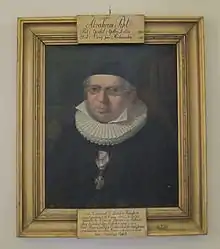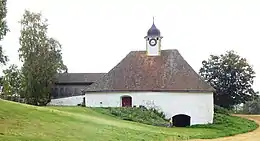Abraham Pihl | |
|---|---|
 Abraham Pihl (portrait in his church) by Johannes Flintoe | |
| Born | 3 October 1756 Gausdal, Norway |
| Died | 20 May 1821 (aged 64) |
| Occupation(s) | priest, architect, astronomer, watchmaker |
| Notable work | Vang church at Ridabu |


Abraham Pihl (3 October 1756 – 20 May 1821) was a Norwegian clergyman, astronomer, and architect.[1]
Biography
Abraham Pihl was born in Gausdal, Oppland County, Norway. He completed seminary at the University of Copenhagen in 1783, where he had also studied mathematics, mechanics and astronomy.[2]
In 1784, Pihl became vicar of Flekkefjord in the county of Vest-Agder. From 1785 he was appointed Denmark-Norway's astronomical observer in Norway. In 1789, he was appointed to serve as priest of Vang Church in Hamar, Hedmark, where he would serve until his death in 1821.[3] When Vang church burned down in 1804, Pihl designed the new church and oversaw construction work. The church has an octagonal shape and, with 1000 seats, is the second largest of Norway's octagonal churches. The building later served as a model for octagonal churches on the western side of Mjøsa.[4]
Pihl developed a large collection of self-made astronomical instruments, and also made telescopes and sextants for others. He designed Vang Church, which burned down and was rebuilt between 1804 and 1810. He started large-scale production of pendulum clocks. The rectory became the largest employer in Vang, with up to 140 persons employed.[5][6] His interest in practical matters categorized him as a so-called "potato priest" (Norwegian: potetprest).[7][8]
Honors
He was decorated Knight of the Order of Dannebrog in 1809 for his scientific efforts.[9]
Personal life
His father Andreas Pihl (1726–1781) was vicar of Gausdal. His grandfather Joachim Pihl (1689–1762) was provost for Gudbrandsdalen. In 1784, he married Anna Cathrine Neumann (1764–1850), daughter of Jacob Neumann, who operated the Hassel Iron Works in Modum. They were the parents of eight children and were the grandparents of engineers Oluf Pihl and Carl Abraham Pihl.[10][11]
References
- ↑ Abraham Pihl – Prest, prost og tusenkunstner (Gausdal Historielag)
- ↑ Norsk Teknisk Museum: Abraham Pihl, Observatør
- ↑ Vang kirke, Hamar (Kirkesøk)
- ↑ Jan Wiig. "Abraham Pihl: utdypning. I Norsk biografisk leksikon". Retrieved 25 November 2013.
- ↑ Godal, Anne Marit (ed.). "Abraham Pihl". Store norske leksikon (in Norwegian). Oslo: Norsk nettleksikon. Retrieved 10 May 2013.
- ↑ Wiig, Jan. "Abraham Pihl". In Helle, Knut (ed.). Norsk biografisk leksikon (in Norwegian). Oslo: Kunnskapsforlaget. Retrieved 10 May 2013.
- ↑ Brandt, Nils (1973). Potetprester. Oslo: Landbruksforlaget.
- ↑ Berg, Kaare S. (1983). Bygdebok for Nes herred, Vest-Agder: bd. Kulturhistorie. Nes: Nes Bygdeboknemnd. p. 203.
- ↑ To essays om Abraham Pihl (Knut Imerslund, Høgskolen i Hedmark)
- ↑ "Neumann-familien (Hassel jernverk)". Archived from the original on 2 April 2015. Retrieved 5 March 2015.
- ↑ Gunnar Nerheim: Oluf Pihl, Ingeniør og Kraftutbygger (Norsk biografisk leksikon)
Other sources
- Imerslund, Knut (2010) Abraham Pihl - prest, prost og tusenkunstner (Oplandske Bokforlag) ISBN 978-82-7518-173-0
External links